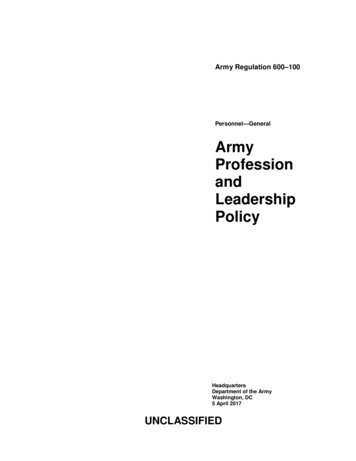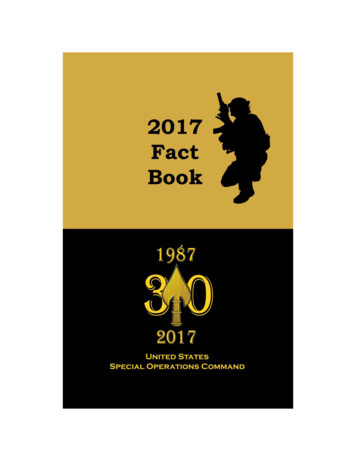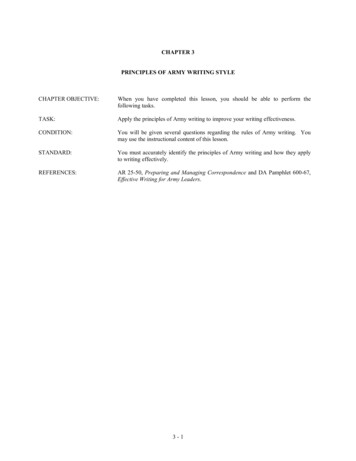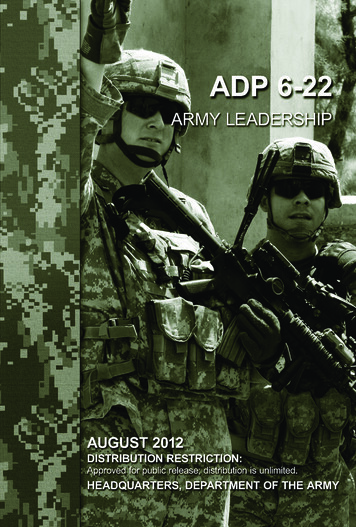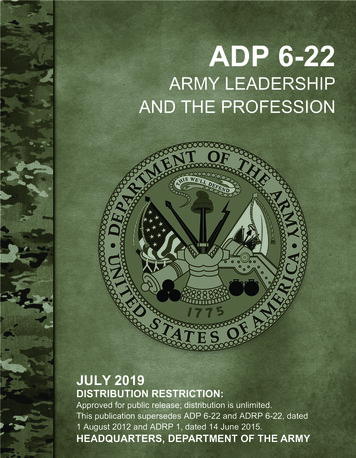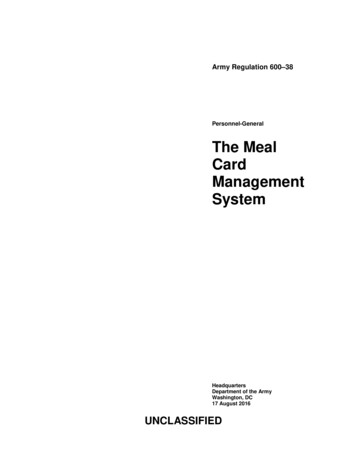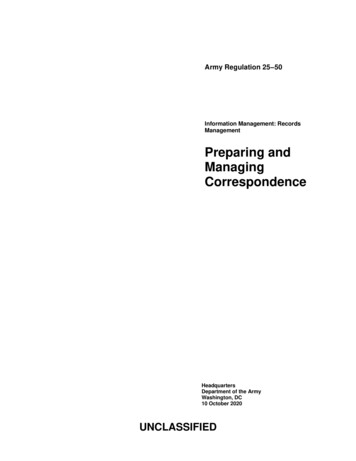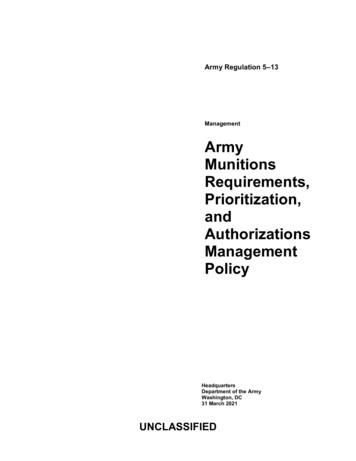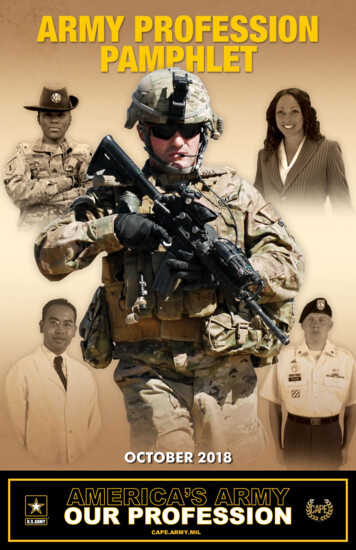
Transcription
OCTOBER 2018AMERICA’S ARMYOUR PROFESSIONCAPE.ARMY.MIL
FY 19/20 America’s Army – Our Profession ThemePREVAILING IN LARGE-SCALECOMBAT OPERATIONS: CHARACTER,TRUST, AND MISSION COMMANDThe intent of the America’s Army – Our Profession theme is toeducate the Total Force on The Army’s Framework for CharacterDevelopment and the mutually supporting nature of culture,climate, and identity. In order to prevail in large-scale combatoperations, Soldiers and Army Civilians must understand theinterdependent relationships between character, trust, andmission command.Strategic leaders strengthen the Army Culture of Trust andset the conditions that support Professional OrganizationalClimates and living our shared identity. Organizational leadersestablish climates that motivate Soldiers and Army Civiliansto live by and uphold the Army Ethic in the exercise of missioncommand. Direct leaders inspire their followers to embrace ourshared identity as Trusted Army Professionals.“Our leaders, then, are going to have to be self-starters. They’re going tohave to have maximum amounts of initiative critical thinking skills [and]character, so they make the right moral and ethical choices in the absence ofsupervision under intense pressure in combat.”General Mark A. Milley39th Chief of Staff, U.S. ArmyHave any suggestionsor questions?(845) 938-0467http://cape.army.mil/contactus.php
TRAINING ANDEDUCATION RESOURCESAs the Army’s proponent for the Army Profession, the Army Ethic,and Character Development, CAPE’s goal is to make training andeducation about the Army Profession straightforward and effectivewithout burdening the organization with more tasks or extensivepreparation requirements. The easy‑to‑use online resources beloware designed to support your training.Virtual SimulatorsDoctrineBrochuresCase StudiesTraining Support Packages (TSP)Army Professionand Ethic FacultyDevelopment CourseIdentify Key Concepts ofthe Army ProfessionTHE ARMY PROFESSION 1
THE ARMYPROFESSIONThis pamphlet contains the key concepts andterminology presented in Army Doctrine ReferencePublication (ADRP) 1, The Army Profession.This pamphlet is produced by the Center for theArmy Profession and Ethic (CAPE).If you have any suggestions or questions, pleasecontact CAPE athttp://cape.army.mil/contactus.phpOctober 2018CAPE.ARMY.MIL2
TABLE OF CONTENTSOur History.4What it Means to be a Profession.7The U.S. Army as a Profession.8The Army Profession is a Vocation.9Who are Members of the Army Profession?. 11The Army Ethic.13Professional Certification Process.14Preserving the Army Profession.16Essential Characteristics of the Army Profession. 17Trust.19Honorable Service.20Military Expertise.23Stewardship of the Army Profession.24Civil-Military Relations.25Esprit de Corps.27Oaths, Creeds, and Norms of Conduct.29Oaths of Office & Enlistment.30Soldier’s Creed and Warrior Ethos.32Noncommissioned Officer Creed.33Army Civilian Corps Creed.34Title 10 U.S. Code Requirement of Exemplary Conduct.36Code of Conduct for Members of the United States Armed Forces.37Army Values.38Soldier’s Rules.39Timeline of the U.S. Army.40THE ARMY PROFESSION 3
OUR HISTORYThe United States Army is the largest branch of the United StatesArmed Forces and is responsible for land-based military operations.It is the oldest established branch of the U.S. military and is one ofseven U.S. uniformed services. The modern Army has its roots in theContinental Army, which was formed on June 14, 1775, to meet thedemands of the American Revolutionary War before the establishmentof the United States. The Congress of the Confederation officiallycreated the United States Army on June 3, 1784, after the end of theRevolutionary War, to replace the disbanded Continental Army.The U.S. Army Motto, “This We’ll Defend,” was first used by the WarOffice of the Continental Congress during the American RevolutionaryWar. “This We’ll Defend” simply states our commitment and oath todefend the Constitution of the United States and its citizens.4
ARMY NATIONAL GUARDThe National Guard is a unique and essential element of the U.S.military. Founded in 1636 as a citizen force organized toprotect families and towns from hostile attacks, today’sNational Guard Soldiers hold civilian jobs or attendcollege while maintaining their military training parttime, always ready to defend the American way of life inthe event of emergencies. The Army National Guard hasboth a state and national mission.U.S. ARMY RESERVEThe history of America’s federal citizen Soldier extends back to theearly years of the republic. In fact, one of our foundingfathers, leader of the Continental Army, and firstpresident, George Washington, presented his concept fora federalized militia in 1783 to a congressional committeecreated under Alexander Hamilton to investigate andrecommend a military establishment.ARMY CIVILIAN CORPSIn 1776 the Board of War and Ordnance was established withthe responsibility of equipping and dispatching troops,maintaining personnel records, and disbursing funds.Five members of the Continental Congress, severalclerks, and a paid secretary – Richard Peters, the firstArmy Civilian – comprised the board. Subsequentlythe Continental Army hired Civilians for driving, crafts,carpentry, and laborer jobs. Today Army Civilians have a crucialrole in the ethical design, generation, support, and applicationof landpower.THE ARMY PROFESSION 5
“The Army is a profession because of the expertwork it produces, because the people in the Armydevelop themselves to be professionals, andbecause the Army certifies them as such. They’renot just time servers; they’re not governmentbureaucrats. These are people who are motivatedintrinsically by a calling – far more than a job– the desire to serve and defend the Republic.Not just anybody can go out and run a patrol onthe streets of Baghdad. So that is what uniquelymakes the Army a profession – the effective andethical application of landpower that the Americanpeople trust to defend their security interests.”Don M. Snider, Ph.D.CAPE Senior Fellow Emeritus6
WHAT IT MEANS TO BEA PROFESSIONA profession is a trusted, disciplined, and relatively autonomousvocation whose members:ii Provide a unique and vital service to society, without which it couldnot flourish.ii Provide this service by developing and applying expert knowledge.ii Earn the trust of society through ethical, effective, and efficientpractice.ii Establish and uphold the discipline and standards of their art andscience, including the responsibility for professional developmentand certification.ii Are granted significant autonomy and discretion in the practice oftheir profession on behalf of society.THE ARMY PROFESSION 7
THE U.S. ARMYAS A PROFESSIONArmy Profession: A unique vocation of experts certified in theethical design, generation, support, and application of landpower,serving under civilian authority and entrusted to defend theConstitution and the rights and interests of the American people.Army Professional: A Soldier or Army Civilian who meets theArmy Profession’s certification criteria in character, competence,and commitment.The professional responsibilities of a Soldier or ArmyCivilian include:ii Preserving the trust and confidence of the American people andfellow Army professionals by sustaining essential characteristicsof the profession, including Trust, Military Expertise, HonorableService, Stewardship, and Esprit de Corps.ii Strengthening our Honorable Service and demonstrating ourstrength of character by living in accordance with the ArmyValues and the Army Ethic. Those values and principles are thebasic moral building blocks of our profession.ii Advancing our expert knowledge, skills, and abilities in unifiedland operations, and developing and certifying every Armyprofessional in character, competence, and commitment.ii Through our Stewardship, ensuring the present and futuredevelopment and effectiveness of the profession’s people andresources.ii Creating and sustaining a professional organizational climate,increasing cohesion, and fostering pride in our professionthrough Esprit de Corps.8
THE ARMY PROFESSIONIS A VOCATIONThe Army Profession plays a vital role as a partner withthe joint community and other government services thatdedicate themselves to serving the Nation. We pursue anoble calling and render Honorable Service. We remainremarkably privileged to provide for the common defense ofthe American people, as we operate to prevent conflict, shapeoperational environments, and win the Nation’s wars.Army professionals are individually responsible for developing andmaintaining moral character and competence, on and off duty,while following their own personal commitment to work that is morethan a job – it’s a calling to serve in the defense of the Nation. Asstewards of this honorable profession, all Army professionals mustnot only regulate themselves but also their fellow professionals.THE ARMY PROFESSION 9
ARMY MISSIONThe U.S. Army’s mission is to fightand win our Nation’s wars byproviding prompt, sustained landdominance across the full range ofmilitary operations and spectrumof conflict in support of combatantcommanders. We do this by:10 Executing Title 10 and Title 32United States Code directives,to include organizing,equipping, and training forcesfor the conduct of prompt andsustained combat operationson land. Accomplishing missionsassigned by the President,Secretary of Defense, andcombatant commanders, andtransforming for the future.
WHO ARE MEMBERS OFTHE ARMY PROFESSION?“We need to reinvest ourselves in the Profession continuously to maintainthe fact that we are a profession.“SMA Daniel Dailey15th Sergeant Major of the ArmyTWO COMMUNITIES OF PRACTICEThe Army Profession has two broad categories of professionals– Soldiers and Army Civilians. These professionals comprise twocomplementary and mutually supporting communities within theArmy Profession.Profession of Arms: A community within the Army Professioncomposed of Soldiers of the Regular Army, Army National Guard, andArmy Reserve.Army Civilian Corps: A community within the Army Professioncomposed of civilians serving in the Department of the Army.Upon taking our initial oaths, we voluntarily join the Army Professionas aspiring Army professionals. Upon completion of the appropriaterequirements, we receive our initial certification. This is a significantfirst step in our development as trusted Army professionals. Theresponsibility for continuing development and certification is a mutualone, shared between the individual and the Army Profession. Armyprofessionals undergo multiple certifications in order to assumegreater responsibility or duty requiring advanced knowledge or skills.When members of the profession of arms receive their initialcertification and commit themselves to live by the Army Ethic, both onand off duty, they become Soldiers for Life. Soldiers for Life contributeto the well-being of the Nation after military service by continuing todemonstrate exemplary conduct in their communities.THE ARMY PROFESSION 11
The Framework of the Army EthicIndividual asProfessional**Army asProfession*Legal FoundationsMoral FoundationsLegal-Institutional The U.S. Constitution Title 5, 10, 32, USC Treaties Status-of-Forces Agreements Law of WarMoral-Institutional The Declaration ofIndependence Just War Tradition Trust Relationships ofthe ProfessionLegal-Individual Oaths: Enlistment Commission Office USC – Standards of ExemplaryConduct UCMJ Rules of Engagement Soldier’s RulesMoral-Individual Universal Norms: Basic Rights Golden Rule Values, Creeds, and Mottos: “Duty, Honor, Country” NCO Creed Army Civilian Corps Creed Army Values The Soldier’s Creed Warrior EthosNCOUCMJnoncommissioned officerUniform Code of Military JusticeU.S.USCUnited StatesUnited States CodeThe Army Ethic is the evolving set of laws, values, and beliefs, embedded within the Army Culture of Trust thatmotivates and guides the conduct of Army professionals bound together in common moral purpose.*Laws, values, and norms for performance of collective institution.**Laws, values, and norms for performance of individual professionals.12
The Army EthicThe Heart of the ArmyThe Army Ethic includes the moral principles that guide our decisions and actions aswe fulfill our purpose: to support and defend the Constitution and our way of life.Living the Army Ethic is the basis for our mutual trust with each other and theAmerican people. Today our ethic is expressed in laws, values, and shared beliefswithin American and Army cultures. The Army Ethic motivates our commitment asSoldiers and Army Civilians who are bound together to accomplish the Army missionas expressed in our historic and prophetic motto: This We’ll Defend.Living the Army Ethic inspires our shared identity as trusted Army professionals withdistinctive roles as honorable servants, Army experts, and stewards of the profession.To honor these obligations, we adopt, live by, and uphold the moral principles of theArmy Ethic. Beginning with our solemn oath of service as defenders of the Nation, wevoluntarily incur the extraordinary moral obligation to be trusted Army professionals.Trusted Army Professionals AreHonorable Servants of the Nation – Professionals of Character:We serve honorably – according to the Army Ethic – under civilian authority whileobeying the laws of the Nation and all legal orders; further, we reject and reportillegal, unethical, or immoral orders or actions.We take pride in honorably serving the Nation with integrity, demonstrating characterin all aspects of our lives.In war and peace, we recognize the intrinsic dignity and worth of all people, treatingthem with respect.We lead by example and demonstrate courage by doing what is right despite risk,uncertainty, and fear; we candidly express our professional judgment tosubordinates, peers, and superiors.Army Experts – Competent Professionals:We do our duty, leading and following with discipline, striving for excellence, puttingthe needs of others above our own, and accomplishing the mission as a team.We accomplish the mission and understand it may demand courageously risking ourlives and justly taking the lives of others.We continuously advance the expertise of our chosen profession through lifelonglearning, professional development, and our certifications.Stewards of the Army Profession – Committed Professionals:We embrace and uphold the Army Values and standards of the profession, alwaysaccountable to each other and the American people for our decisions and actions.We wisely use the resources entrusted to us, ensuring our Army is well-led andwell-prepared, while caring for Soldiers, Army Civilians, and Families.We continuously strengthen the essential characteristics of the Army Profession,reinforcing our bond of trust with each other and the American people.THE ARMY PROFESSION 13
PROFESSIONALCERTIFICATION PROCESSMember of theArmy ProfessionVoluntaryEntryOath ervingprofessionalProgressivecertificationsEnd ofofficial serviceTraining, education, evaluations,promotions, and assignmentsArmy retireesand Army veteransof honorable servicePROFESSIONAL CERTIFICATION CRITERIAii CHARACTER: Dedication and adherence to the Army Ethic, includingArmy Values, as consistently and faithfully demonstrated in decisionsand actions.ii COMPETENCE: Demonstrated ability to successfully perform dutywith discipline and to standard.ii COMMITMENT: Resolve to contribute honorable service to theNation and accomplish the mission despite adversity, obstacles,and challenges.Certification is verification and validation of an Army professional’scharacter, competence, and commitment to fulfill responsibilities andsuccessfully perform assigned duty with discipline and to standard.The Army has significant autonomy to make decisions due to its uniquemilitary expertise and moral obligation to serve the best interests of theNation. For example, Congress does not normally dictate doctrine to theArmy; it trusts the Army to develop it correctly. Through certification, theArmy strengthens trust by confirming the professional development ofSoldiers and Army Civilians and the readiness of organizations.Certification in the Army has two purposes. For the Army Profession,certification demonstrates to the American people that the Army isqualified to perform its expert work. For Army professionals, certificationalso provides motivation and a sense of accomplishment. Examplesinclude an earned rank or credential, selection for a leadershipassignment, or successful completion of training.The Army Profession certifies the character, competence, and commitmentof its Soldiers and Army Civilians throughout their service. Certificationmethods include:ii Official promotion and evaluation systems.ii Professional training and education within Army schools, includingbranch, skill, and functional area qualifications.ii Centralized certifications and assignments for leadership andcommand positions.14
“Discipline is based on pride in theProfession of Arms, on meticulousattention to details, and on mutualrespect and confidence. Disciplinemust be a habit so engrained thatit is stronger than the excitement ofbattle or the fear of death.”General George S. Patton, Jr.Former Commanding General, Third and Seventh ArmiesTHE ARMY PROFESSION 15
PRESERVING THEARMY PROFESSIONAmerica’s Army was founded on June 14, 1775. Under the new Constitutionenacted in 1789, it became a military department of the federal government,a hierarchical bureaucratic institution. Many decades later, by the early 1900s,generations of foresighted Army leaders slowly transformed the Army into themodern professional entity of which we are members today.The first cohort professionalized by today’s standards was the officercorps. It developed a codified body of expert military knowledge in landwarfare doctrine, instituted formal programs of career-long militaryeducation, and cultivated a unique military culture grounded in the ArmyEthic of honorable service to the Nation. Because of these and other suchadvancements listed above, bonds of trust between the Army and theAmerican people began to grow.For many years, some believed that only officers were professionals. But inthe aftermath of Vietnam, while rebuilding the hollow Army of the 1970s, suchstatus was extended through professional development to warrant officers,enlisted, and Army Civilians as their vital contributions and value to theprofession gained recognition.The Army as an institution has a dual character. It is both a governmentaloccupation within a military department organized as a hierarchicalbureaucracy and, more recently, recognized collectively as a militaryprofession. These two aspects of the institution – bureaucracy and profession– have very different characteristics and ways of behaving. Both aspects arenecessary within the variety of organizations and functions within the Army,but, overall, the challenge is to keep the predominant culture and climate ofthe Army as that of a military profession.16
THE ARMY PROFESSION 17MILITARYEXPERTISETRUSTOUR LONG-TERMRESPONSIBILITYESPRIT DECORPSLoyalty Duty Respect Selfless Service Honor Integrity Personal CourageThe Army Ethic – The Heart of the ArmyOUR WINNINGSPIRITSTEWARDSHIPOFTHE PROFESSIONTrust among Leaders, Peers, and SubordinatesTrust between Soldiers and Army CiviliansTrust in the Army by Army Professionals and their FamiliesTrust between the Army and the American PeopleNHICAL APPLICATIO THE BEDROCKING TO OUR ET LANDPOWEROF OUROUR NOBLE CALL IFICEOFSERVICE AND SACRPROFESSIONHONORABLESERVICEEssential Characteristics of the Army Profession
“Trust matters in three ways for us as part of the militaryprofession. Trust matters with the American people. That’s thevery essence of why we exist. Trust matters up and down andleft and right. And most importantly it matters in combat That’s the very essence of mission command, and it’s all builtupon that single word that’s in the doctrine, the bedrock ofthe Army Ethic, which is trust. I trust that you will achieve thepurpose, and you will do it ethically and morally and legallycorrect. And that takes an immense and off-the-charts levelof character. You’ll have to have a spine of titanium steel towithstand some of the pressures of intense ground combat,and you’ll always have to do the right thing when no one islooking.”General Mark A. Milley39th Chief of Staff, U.S. Army18
Trust – The Bedrock of Our ProfessionThe American people place special trust and confidence in the Armyas a profession that considers honorable service to the Nation itshighest priority. Trust is the bedrock of the Army’s relationship with theAmerican people. Our professional responsibility is to preserve thisearned trust. Within the Army Profession, mutual trust is the organizingprinciple necessary to build cohesive teams. The Army’s ability tofulfill its strategic role and discharge its responsibilities to the Nationdepends on: Trust among Leaders, Peers, and Subordinates Trust between Soldiers and Army Civilians Trust in the Army by Army Professionals and their Families Trust between the Army and the American PeopleTHE ARMY PROFESSION 19
Honorable Service – Our Noble CallingThe Army exists as a profession for one reason: to serve the Nationby supporting and defending the Constitution in a way that upholdsthe rights and interests of the American people. This is the basis forthe Army Ethic, which is the heart of the Army Profession. The ArmyEthic defines what it means to serve honorably. Our professionalresponsibility is to daily contribute honorable service, living by andupholding the Army Ethic in the conduct of our mission, performanceof duty, and all aspects of life.“Recognizing readiness as the Army’s first priority, we understand thatthe most critical factor in delivering Army readiness is the developmentof leaders of character at every level. Ethical leaders of characterstrengthen the bond between our Army and our Nation ”General James C. McConville36 th Vice Chief of Staff, U.S. Army20
“[W]e must reform our outdatedpersonnel system to one thatdevelops smart, thoughtful,innovative leaders of characterwho are comfortable withcomplexity and are capable ofoperating from the tactical up tothe strategic level.”Honorable Mark T. Esper23rd Secretary of the U.S. ArmyTHE ARMY PROFESSION 21
“The American Soldier is a proud one and he demands professionalcompetence in his leaders. In battle, he wants to know that the jobis going to be done right, with no unnecessary casualties. TheAmerican Soldier expects his sergeant to be able to teach him how todo his job. And he expects even more from his officers.”General of the Army Omar N. BradleyFirst Chairman of the Joint Chiefs of Staff“There is nothing solikely to produce peaceas to be well-preparedto meet an enemy.”George WashingtonFirst President of the United States22
Military Expertise – Our Application of LandpowerAs a profession, our military expertise is the ethical design,generation, support, and application of landpower. This is howthe Army contributes honorable service in defense of the Nation.Our professional responsibility is to continually advance our expertknowledge and skills in landpower and to certify Army professionals.To sustain our expertise, the necessity of lifelong learning is acceptedby all Army professionals.The Army professional must develop expert knowledge in four fields: Military–technical: How the Army applies landpower toaccomplish the mission. Moral–ethical: How the Army accomplishes the mission in theright way according to the values of the American people. Political–cultural: How the Army understands and operates ina multicultural, complex world. Leader-human development: How the Army recruits,develops, and inspires Army Professionals.THE ARMY PROFESSION 23
Stewardship of the Army ProfessionStewardship is the responsibility of Army professionals to strengthenthe Army as a profession and to care for the people and otherresources entrusted to them by the American people. Armyprofessionals continuously strive for excellence in the performance ofduty to accomplish every mission ethically, effectively, and efficiently.Stewardship requires that we understand our work is more than just ajob; it is an office. We accept this sense of office when sworn in underoath; this is explicit in the oaths taken by Army Officers and ArmyCivilians and implied in the Oath of Enlistment. These oaths concludewith the language: “and that I will well and faithfully discharge theduties of the office upon which I am about to enter.”24
CIVIL-MILITARY RELATIONSSenior Army leaders have a direct stewardship responsibility tostrengthen trust with the American people through their professionalengagement in civil-military relations. Civilian authority over themilitary is established and codified in our Constitution and is themechanism by which the American people, through their electedand appointed officials, exercise oversight of the military. Armyprofessionals understand this and appreciate the traditional role thatsuch oversight has played throughout our history.Final decisions and responsibility for national strategy and policy,and for the organization and resourcing of the Army rest with civilianauthority. With this understanding, Army professionals have a duty toprovide their unique and vital expertise to the decision-making process.It is our responsibility to ensure that professional military advice iscandidly and respectfully presented to civilian leaders.THE ARMY PROFESSION 25
“The Soldier’s heart, the Soldier’s spirit, theSoldier’s soul are everything. Unless theSoldier’s soul sustains him he cannot be reliedon and will fail himself and . his country inthe end.”General of the Army George C. Marshall15th Chief of Staff, U.S. Army26
Esprit de Corps – Our Winning SpiritSuccess in all our missions requires spirited and dedicated Soldiersand Army Civilians who strive for excellence. We are bonded togetherthrough mutual trust, in cohesive teams – units and organizations – aband of brothers and sisters. Our shared identity, sense of purpose,and winning spirit strengthen our individual and collective commitment,resilience, and courage – a never-quit resolve – enabling us topersevere and accomplish even the most arduous mission.Soldiers and Army Civilians are well-trained, well-equipped, and readyto accomplish a variety of missions. However, these preparationsalone are not enough. The challenges of warfare – a formidable anddangerous enemy, a hostile and uncertain environment, physical andemotional fatigue, separation from loved ones, and attendant stresses– wear on even the most experienced Army professional. To persevereand prevail in these conditions requires an intangible resilience that isat the core of our ethos.THE ARMY PROFESSION 27
We the People of the United States,in Order to form a more perfectUnion, establish Justice, insuredomestic Tranquility, provide forthe common defense, promote thegeneral Welfare, and secure theBlessings of Liberty to ourselvesand our Posterity, do ordain andestablish this Constitution for theUnited States of America.Preamble to the United States Constitution28
OATHS, CREEDS, ANDNORMS OF CONDUCT“We are at a critical time in our Army’shistory, and it is our people – ourprofessionals – who will chart our pathforward and ensure we remain the bestfighting force in the world. Our ArmyProfession recognizes that all – Soldiersand Civilians – who have taken the oathto support and defend our Constitutioncommit themselves to the values that wehold so dear.”General Gustave F. Perna19th Commanding General, U.S. Army Materiel CommandTHE ARMY PROFESSION 29
ARMY CIVILIAN OATH OF OFFICE“I,, do solemnly swear (or affirm) that I will supportand defend the Constitution of the United States against allenemies, foreign and domestic; that I will bear true faithand allegiance to the same; that I take this obl
Army Professional: A Soldier or Army Civilian who meets the Army Profession's certification criteria in character, competence, and commitment. The professional responsibilities of a Soldier or Army Civilian include: i Preserving the trust and confidence of the American people and fellow Army professionals by sustaining essential characteristics
